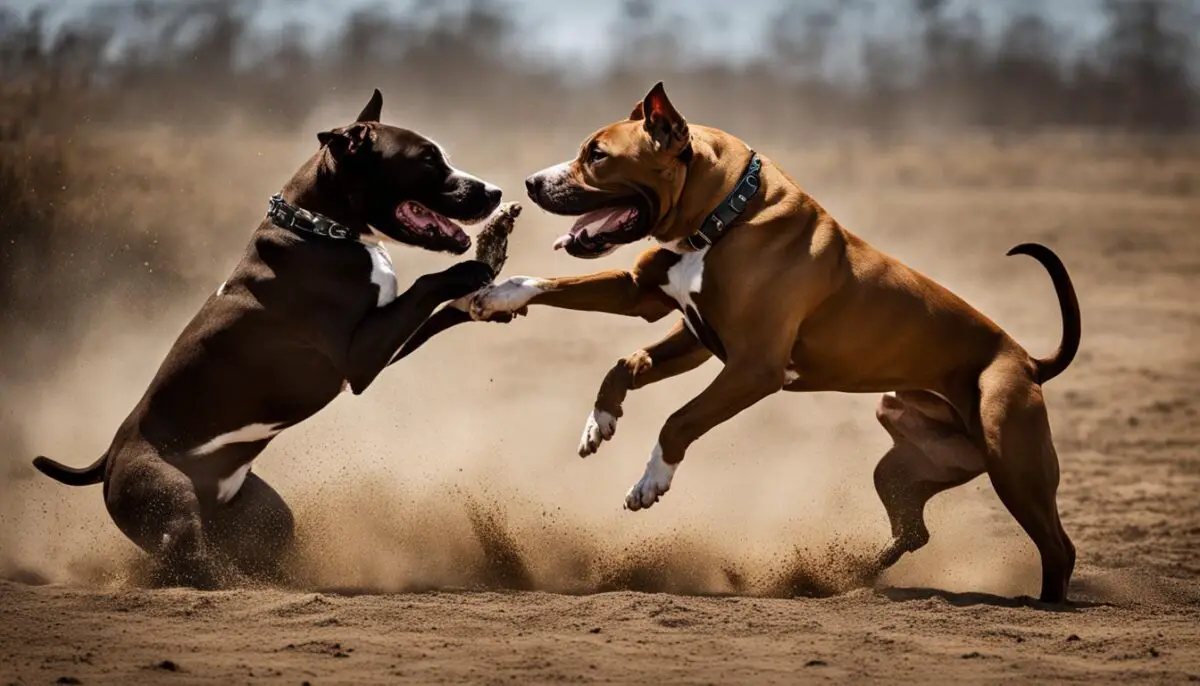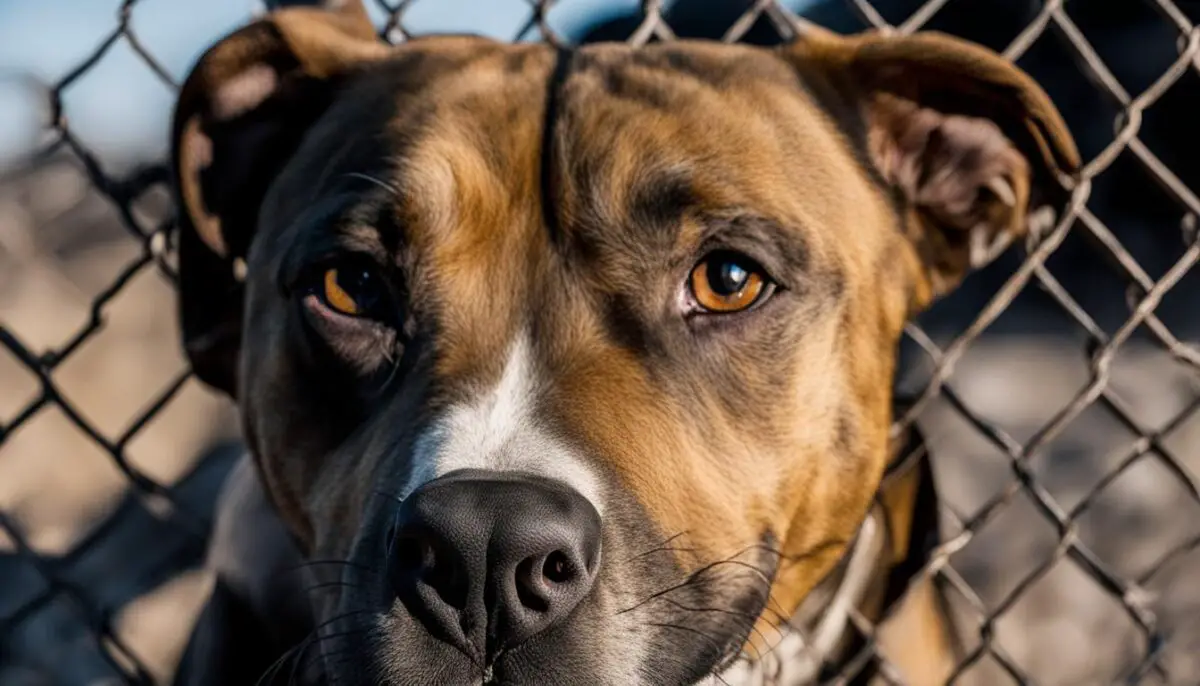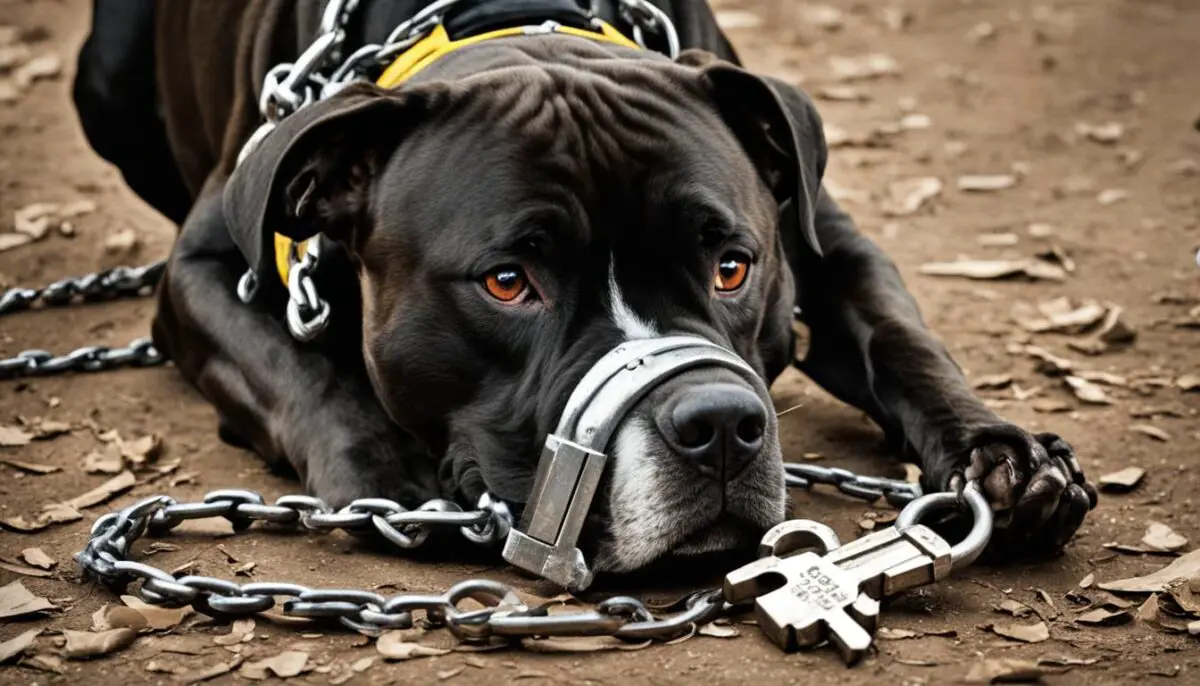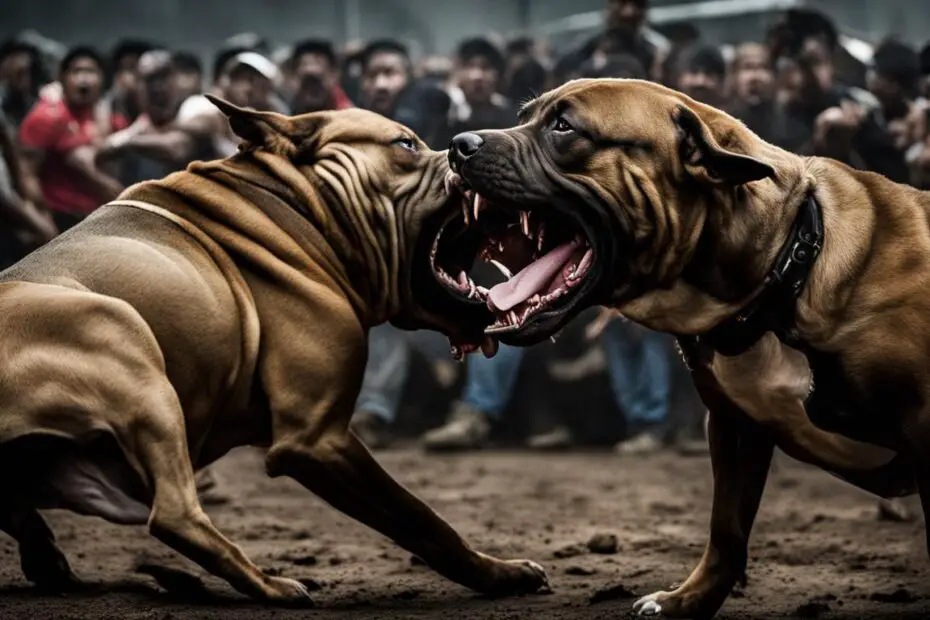Pitbulls are often associated with dogfighting, a brutal and illegal activity that takes place in underground rings. However, it’s important to understand that not all pitbulls are aggressive or bred for fighting. In fact, the majority of pitbulls today are the result of random breeding, leading to a wide range of behavioral predispositions.
When bull-baiting was outlawed, dogfighting emerged as an alternative, and pitbulls were selected and bred for their fighting abilities. However, it’s crucial to evaluate and treat each pitbull as an individual and focus on responsible ownership and training.
Key Takeaways:
- Pitbulls are descendants of the English bull-baiting dog and were bred for fighting ability.
- Today, the majority of pitbulls are the result of random breeding, leading to a wide range of behavioral predispositions.
- Not all pitbulls exhibit aggressive behavior, and responsible ownership and training are essential.
- Understanding the history and reasons behind dogfighting can help address the issue effectively.
- Education and supporting laws that hold owners accountable are key to ending dogfighting and reducing harm.
The History of Dogfighting
Dogfighting has a long and dark history, dating back to the 1750s. What originated as a form of entertainment and betting on bloodsport between dogs evolved into a professional sport in the 1860s, with the establishment of organized fighting pits.
Despite being classified as a felony offense in all 50 states and many other jurisdictions, the cruel practice of dogfighting continues to persist today. Estimates suggest that tens of thousands of people may still be involved in these illegal activities in the United States.
The advent of the internet has made it easier for dogfighters to exchange information, facilitating the underground network of dog fighting rings. Greed, the thrill of the brutal spectacle, and the desire to use dogs as a means to demonstrate strength and prowess are some of the driving forces behind people’s involvement in these illegal dog fights.
The images of dogfighting rings are disturbing, and the consequences for the animals involved are devastating. It is crucial that we continue to raise awareness about this issue and work towards putting an end to these cruel practices.
“Dogfighting is a cruel and illegal activity that inflicts immense suffering on animals. It is our responsibility to stand against this brutality and protect innocent lives.” – Animal Rights Advocate

The Training and Treatment of Dogfighting Victims
Dogs used for fighting are often subjected to a life of isolation and mistreatment. They are typically kept on heavy chains, deprived of socialization with other dogs and humans. However, it’s important to recognize that some professional fighters do invest time and money in their animals, albeit for an unethical purpose. These dogs may receive a certain level of care, including nutrition, basic veterinary attention, and exercise.
The training involved in dogfighting focuses on conditioning dogs to enhance their aggression and mask any pain or fear they may experience during fights. This conditioning process may involve the use of both legal and illegal drugs. It’s a cruel practice that prioritizes winning over the well-being of the animals involved.
The consequences of dogfighting are severe, particularly for the dogs themselves. Injuries sustained in fights can be life-threatening, leaving the animals with long-lasting physical and psychological trauma. Losing dogs are often callously discarded, killed, or left untreated, further perpetuating the cycle of cruelty.
The Impact on Dogfighting Victims
“Injuries suffered in fights can be severe, and losing dogs are often discarded, killed, or left untreated.”


The physical and emotional scars from dogfighting are deep and devastating. It’s heartbreaking to witness the aftermath of this cruel practice, which ultimately strips these animals of their inherent right to live a life free from suffering.
The Laws Related to Dogfighting
Dogfighting is a despicable and inhumane practice that inflicts immense suffering on animals. To combat this cruel activity, laws have been implemented to protect the welfare of animals and stop dogfighting. When it comes to the legal framework surrounding dogfighting, it is important to understand the severity of the penalties and the challenges in enforcement.
Laws and Penalties
“Dogfighting is a felony offense in all 50 states and many other jurisdictions.”
In all 50 states, dogfighting is considered a felony offense. This means that those involved in organizing, promoting, or participating in dogfights can face significant legal consequences, including imprisonment and hefty fines. Moreover, the possession of dogs for the purpose of fighting is also considered a felony offense in most states. The severity of these penalties underscores the commitment to eradicating this cruel practice.
Additionally, being a spectator at a dogfight is illegal in all states. This recognizes the role that spectators play in sustaining and perpetuating dogfighting. By criminalizing attendance, authorities aim to disrupt the demand for these events and discourage individuals from participating or supporting them.
Federal Legislation
“The Animal Welfare Act and the Animal Fighting Prohibition Enforcement Act provide federal penalties for interstate commerce related to dogfighting.”
Alongside state-level legislation, federal laws have been enacted to combat dogfighting. The Animal Welfare Act and the Animal Fighting Prohibition Enforcement Act specifically target the interstate commerce of animals involved in dogfighting. These laws provide federal penalties for those engaged in activities that support or facilitate dogfighting across state lines. Furthermore, attending an animal fight is a federal offense, reinforcing the commitment to protect animals from cruelty at the national level.
Enforcement Challenges
While the laws surrounding dogfighting are comprehensive, enforcing and prosecuting dogfighting cases can be challenging. Dogfighting often takes place in secretive and underground settings, making it difficult for authorities to gather evidence and identify those involved. Additionally, the resources required for thorough investigation and prosecution can be substantial. These challenges highlight the importance of public awareness, reporting, and collaboration between law enforcement agencies and animal welfare organizations to combat dogfighting effectively.
The laws related to dogfighting send a strong message that animal cruelty will not be tolerated. By strengthening legislation, increasing public awareness, and providing support to law enforcement agencies, we can work together to stop dogfighting and protect the well-being of animals.

Laws Related to Dogfighting
| State | Dogfighting Offenses | Possession of Fighting Dogs | Spectating at Dogfights |
|---|---|---|---|
| Alabama | Felony | Felony | Felony |
| Alaska | Felony | Misdemeanor | Misdemeanor |
| Arizona | Felony | Felony | Felony |
| Arkansas | Felony | Felony | Felony |
| California | Felony | Felony | Felony |
| Colorado | Felony | Felony | Misdemeanor |
Pros and Cons of Owning a Pit Bull
Owning a pitbull comes with responsibilities and challenges. Pitbulls form strong bonds with their owners and require a significant amount of quality time and exercise. They can be escape artists and need secure enclosures. Pitbulls are very active dogs that love outdoor activities but may not be compatible with off-leash dog parks. They are known to be great family dogs and social butterflies. However, they may encounter prejudice and negative stereotypes in public. Pitbulls have short coats and require minimal grooming but should not be left outside in the cold.
Conclusion
Dogfighting is a cruel and illegal activity with devastating consequences for both dogs and society. Despite the legal ramifications, this brutal practice continues to persist. However, it’s important to recognize that pitbulls, often associated with dogfighting, can be loving and loyal companions when raised and cared for responsibly.
The key to addressing this issue lies in promoting responsible dog ownership. By focusing on socialization, training, proper containment, and adherence to leash laws, we can create a safer environment for dogs and humans alike.
It’s crucial to remember that breed-specific legislation is not an effective solution. Aggression in dogs is influenced by various factors and individual behavior, rather than solely being determined by breed. Instead, our efforts should be directed towards education and supporting laws that hold owners accountable.
Together, we can work towards ending dogfighting and reducing the harm caused by this heinous practice. Let us stand united in our commitment to stop dog fighting and create a world where all dogs are treated with compassion and respect.
FAQ
Are all pitbulls aggressive?
No, not all pitbulls are aggressive. Pitbulls, like any breed, can vary in temperament based on individual genetics, upbringing, and training.
Why are pitbulls often associated with dogfighting?
Pitbulls have historically been bred for their fighting ability, making them a preferred choice for dogfighting. However, it’s important to note that not all pitbulls are used for this purpose, and responsible ownership can result in well-behaved companions.
How does dogfighting impact the dogs involved?
Dogs used for fighting are often isolated, unsocialized, and subjected to harsh conditions. They may suffer severe injuries and are often discarded, killed, or left untreated if they lose a fight. The conditioning process may involve the use of drugs to enhance aggression and mask pain or fear.
Is dogfighting illegal?
Yes, dogfighting is illegal in all 50 states and many other jurisdictions. Possessing dogs for the purpose of fighting is also a felony offense in most states. Being a spectator at a dogfight is illegal in all states.
What are the consequences of dogfighting?
Engaging in dogfighting can result in criminal charges, including felony offenses. Penalties may include fines, imprisonment, and the loss of ownership rights. The Animal Welfare Act and the Animal Fighting Prohibition Enforcement Act provide federal penalties for interstate commerce related to dogfighting.
What are the responsibilities of owning a pitbull?
Owning a pitbull comes with responsibilities such as socialization, training, proper containment, and adherence to leash laws. Pitbulls require a significant amount of quality time, exercise, and secure enclosures. They can make great family dogs but may face prejudice and negative stereotypes in public.
How can we stop dogfighting?
To stop dogfighting, it is important to promote education, support laws that hold owners accountable, and encourage responsible dog ownership. By addressing the root causes, we can work towards ending dogfighting and reducing harm to both dogs and humans.
Source Links
- https://www.aspca.org/about-us/aspca-policy-and-position-statements/position-statement-pit-bulls
- https://www.aspca.org/investigations-rescue/dogfighting/closer-look-dogfighting
- https://lanecounty.org/government/county_departments/public_works/general_services/animal_services/tips_for_pit_bull_owners

